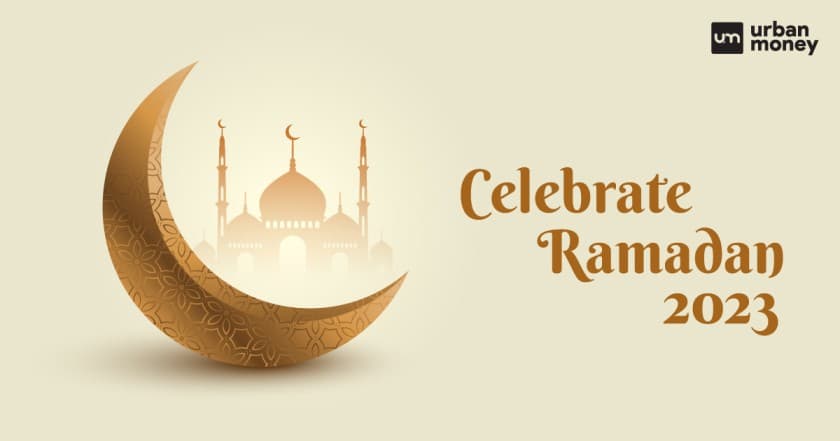- Home
- Indian Holidays
- Ramadan Date
Ramadan 2025 : Date, Time Schedule, History and Significance

- Personalized solutions
- Expert guidance
- Application assistance
- Credit score discussion
- Interest rate comparison
Table of Content


Last Updated: 28 February 2026
In the Islamic calendar, Ramadan is a significant month during which Muslims around the world observe strict fasting from sunrise to sunset. Muslims experience Ramadan fasting from sunrise until dusk throughout the month and refrain from eating, drinking, and smoking. Muslims gather for communal prayer and reflection throughout Ramadan. This month promotes generosity and charitable giving while teaching humility, patience, and self-control.
With this guide, get to know everything about Ramadan 2025. Ramadan Mubarak!
When does Ramadan 2025 start?
Either 28 February, or 1 March
How long is Ramadan 2025?
29 or 30 days, depending on moonsighting.
When does Ramadan 2025 end?
Around 30 March
What is Ramadan?
In the Islamic calendar or Hijri Calendar, Ramadan is the ninth month. Depending on when the Shawwal Moon is visible, the month lasts between 29 and 30 days, leading to the eagerly anticipated Islamic holiday of Eid-al-Fitr on the first of Shawwal. One of Islam’s Five Pillars is Ramadan, and it is during this holy month the Prophet Mohammed received the first revelation of the Al-Quran.
The Arabic term “Ramad” or “Ramida,” which indicates sweltering heat or drought, is where the word “Ramadan” originates. Ramadan so implies refraining from eating or drinking anything between sunrise and dusk. People wish each other using the phrases ‘Ramadan Kareem’ or ‘Ramadan Mubarak’.
Ramadan Celebration in India, 2025
One of the most significant religious holidays observed by Muslims in India is Ramadan. It is a complete lunar month-long period of prayer, fasting, almsgiving, and rejoicing. Ramadan celebrations in India include fasting from sunrise until sunset during this period and refraining from eating, drinking, and smoking. They also follow a tighter set of moral and spiritual guidelines, such as refraining from slander and expressing wrath.
Muslims commemorate the feast of Eid-al-Fitr at the conclusion of Ramadan. It’s a day for feasting and festivities. They visit relatives and friends, exchange gifts, and attend special prayers in the mosque during Ramadan celebrations.
Depending on the area and culture, many practices are used to celebrate Ramadan in India. The Taraweeh prayers, a unique sequence of prayers spoken following the Isha prayer, are done in several regions of the nation by vast crowds of people. In other areas, folks give gifts and adorn their homes. Many people also participate in altruistic acts like feeding the homeless and giving money to those in need.
In addition to its religious significance, Ramadan is a significant cultural occasion in India. They eat a range of festive delicacies, including mouthwatering appetisers like samosas and pakoras as well as the customary sweet meethi seviyan.
Traditions of Ramadan
Muslims worldwide do Ramadan fasting from dawn till nightfall. Moreover, they offer prayers, giving, celebration, and spiritual reflection. Many Muslims follow a number of customs that have been passed down through the years throughout Ramadan.
The Qur’anic recital is one of Ramadan’s most well-known customs. Muslims are urged to read the Qur’an in its entirety. Muslims also recite the tarawih, or special prayers, in addition to the Qur’an. Typically, Tarawih prayers are offered in the mosque.
The practice of breaking the fast at dusk is another significant Ramadan custom. This is referred to as “iftar” and usually entails a meal that has been prepared ahead of time. Muslims generally congregate for prayer and thought after meals. The final ten days of the month are particularly significant because it is thought that this is when the Qur’an is said to have been revealed. Muslims frequently devote more time to prayer and thought over the course of the last ten days in order to repent of their sins.
Lastly, charity is one of the most significant Ramadan customs. Muslims are urged to help people in need during this time by giving generously. Money, food, or other types of support are all examples of charitable acts. Ramadan is thought to offer the greatest benefits for charitable giving throughout the year.
Significance of Ramadan
Marked by fasting, prayer, introspection, and community, Ramadan is the holiest month in the Islamic calendar. Muslims refrain from eating, drinking, and caring for other basic requirements throughout the month. It is a season of greater devotion, worship, and spiritual refreshment. Ramadan also helps to bring Muslims’ attention to the suffering of the less fortunate and inspires them to lend a hand to those in need. Also, it is a time to gather with loved ones and enjoy a feast.
How to Fast During Ramadan 2025?
There are certain tips for a devotee to help them with their fast during Ramadan 2025. Go through the following points to do Ramadan fasting the right way.
- Make sure to eat a healthy suhoor or the pre-dawn meal before fasting begins. Choose foods high in complex carbohydrates, fibre, and proteins, such as oatmeal, whole grains, eggs, nuts, and legumes.
- Drink plenty of fluids throughout the day. Staying hydrated is important while fasting, especially during long summer days. Try to drink at least 2-3 litres of water or unsweetened fruit juices during the day.
- Eat a balanced iftar (evening meal) when breaking your fast. Try to include a variety of foods such as fruits, vegetables, whole grains, and proteins.
- Get plenty of rest and avoid strenuous activities. During Ramadan, it’s important to get enough rest in order to be able to fast and perform your activities during the day.
- Make time for prayer. During Ramadan, Muslims are encouraged to spend more time in prayer and reflection. Try to make time for prayer, even if it’s just for a few minutes each day.
- Practice moderation when eating. Eating too much or too little can lead to health issues. Make sure to eat enough to keep your energy levels up, but not too much that it’s uncomfortable.
- Avoid unhealthy habits. During Ramadan, it’s important to avoid habits such as smoking, drinking alcohol, and overeating.
- Be mindful of your environment. Make sure to keep your environment clean and free of any activities that could distract you from your fasting and prayer.
Who is Exempted from Fasting in Ramadan 2025?
Certain situations demand exemptions from Ramadan fasting. These situations exempting an individual from fasting are given below.
- Pregnant women
- Physical illness
- Mental illness
- Travellers
- Menstruating women
- Women who are breastfeeding
- The elderly who are ill
- Children yet to reach puberty
Dos and Don’ts in Ramadan Fasting 2025
The following do’s, and don’ts must be followed when fasting in Ramadan.
Dos
- Have a nutritious, balanced meal both before sunrise (Suhoor) and after sunset (Iftar).
- Don’t forget to take rest and relaxation breaks throughout the day.
- Throughout Ramadan, spend time with loved ones and friends to celebrate the season of unity.
- Increase your devotional activities, including prayer, almsgiving, and Qur’anic recitation.
- Avoid engaging in any type of idle conversation, slander, or gossip.
- Use the tranquilly and meditate to strengthen your relationship with God.
- Take advantage of the time to consider the previous year and make personal goals for the future.
- Make an attempt to assist others who are less fortunate than you.
Don’ts
- Don’t overindulge in food or beverages at Suhoor and Iftar.
- Don’t consume any food or drink in public during fasting hours.
- Don’t miss any of the five daily prayers.
- Avoid all forms of negative behaviour, such as lying, cheating, and stealing.
- Don’t consume any intoxicating substances such as alcohol.
- Avoid all forms of physical violence.
- Don’t gossip or engage in idle talk.
- Don’t forget to thank God for all that He has blessed you with.
Major Attractions of Ramadan 2025
Ramadan 2025 shapes up to be an incredible month for Muslims all over the world. During this special month, Muslims will observe the Ramadan fast and participate in a variety of Ramadan-related activities. Here are some of the major attractions of Ramadan 2025 you should look forward to:
Taraweeh Prayers
During Ramadan, Taraweeh prayers are offered at night. The mosque’s Imam will read the Qur’an during this time, and Muslims will pray together. This is a fantastic opportunity to deepen your faith and gain spiritual insight.
Iftar
Iftar is the breaking of the fast at sunset, signalling the end of a fasting day. Iftar is traditionally composed of dates, fruits, and traditional sweets. During Ramadan, families and friends get together to break their fast.
Eid-ul-Fitr
Eid-ul-Fitr is a festival commemorating the end of Ramadan and the fast-breaking. Muslims will exchange gifts, visit friends and family, and enjoy festive meals during this time.
Laylat al-Qadr
Laylat al-Qadr is a special Ramadan night with special prayers and blessings. It is thought to be the night when the Qur’an was sent down from heaven and is a very blessed night.
Zakat al-Fitr
Zakat al-Fitr is a type of charity distributed to the poor at the conclusion of Ramadan. This donation is made to ensure that the poor can celebrate Eid-al-Fitr and receive the same blessings as everyone else.
These are just some of the major attractions of Ramadan 2025 that you should look forward to and enjoy. Ramadan is a fantastic opportunity to reconnect with your faith and celebrate the month’s blessings.
Frequently Asked Questions (FAQs)
When Ramadan Started?
Ramadan will begin on 28 February, or 1 March.
Will there be 2 Ramadan in 2030?
As pointed out by the Saudi astronomer Khaled Al-Zaqaq, Ramadan will be experienced two times in the year 2030. This phenomenon last occurred in 1997.
Should I visit Istanbul during Ramadan?
You can visit Istanbul during Ramadan. However, the cities may be crowded as people visit their families during this holy month.
